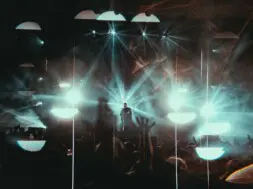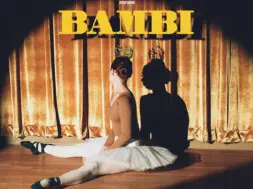
ALBUM: Hacktivist – ‘Outside the Box’
Four years is a long time in music. When Hacktivist burst onto the then vibrant djent scene in 2012 with their self-titled EP, the subgenre was in a boom period and their fusion of Meshuggah riffs and grime rap vocals was exciting enough to draw in listeners beyond your typical tech-heads and music theoreticians. Now their debut full-length Outside the Box has finally seen the light of day, and they’ve lost the element of surprise. True, there aren’t many other prog-metal-meets-hip-hop bands out there, but now that every metalcore band under the sun has appropriated the djent guitar style and grime is breaking out of the rap underground the fusion seems less novel and more opportunistic. If Outside of the Box was twelve tracks of shuddering rap metal it could have killed Hacktivist’s career before it really began.
Instead, this is a surprisingly diverse and unpredictable debut album. The biggest shock is how musical it is, with two songs primarily based on melodic instrumentals and an epilogue that stylistically reprises the first of those with added sung vocals. Even the more metallic tracks feature a healthy dose of melody, in particular the Rou Reynolds feature on “Taken” which compliments his forlorn chorus with sweeping lead guitar. Rather than focusing on a central sound as most debut LPs do, Outside the Box pushes from one end of the rap-metal spectrum to the other: “Rotten” is pure hip-hop with no djent riffs whatsoever, Astroid Boys and Jot Maxi dropping in to give the feel of a posse cut. Regardless of whether they’re rapping over guitarist Timfy James’ chunky riffs or not, Hacktivist’s two MCs J Hurley and Ben Marvin keep the energy levels firmly in the red, the former impressing with technical ability while the latter continues to demonstrate a knack for an aggressive hook.
What could have resulted is the grime-djent bread and butter of Outside the Box being left isolated and forced-in, but instead it works effectively as a rumbling base for the more experimental elements to leap off from. It helps that the juddering riffs are engaging and don’t rely too much on palm muting or dissonance. The fact that the minute-long breakdown that concludes “Buszy” feels like a hard-hitting standout rather than a lapse of quality control speaks volumes for how important the diversity on the album is to making the heavy parts feel properly heavy. There’s enough of a balance between bounce, groove and straightforward mosh fodder to prevent proceedings from getting bogged-down in downtuned shuffles. The choruses aren’t quite as good when they’re not helmed by guest vocalists, but the punchy verses make up for this.
There are times when Hacktivist feel like they’re trying to run before they can walk, particularly in the more conceptual moments and self-aware lyrics that only occasionally work. One common fan criticism meanwhile has been that the re-recording of “Elevate” lacks the gusto of the original, and indeed nothing needed to be done to one of the band’s most likeable songs for it to fit into the loftier context of Outside the Box. The album as a whole suffers from something of a Catch-22 situation as including the interludes and genre-hopping tracks leaves it something of a hodgepodge, but replacing them with what was up to now typical Hacktivist fare would have rendered it one-dimensional. Overall, their decision to mix things up has done them a world of good particularly given the four-year wait for this debut proper, as the alternative may have seen them get written off. This is an album with enormous potential that demonstrates a talented, ambitious band still finding their feet when it comes to producing a coherent full-length body of work.














